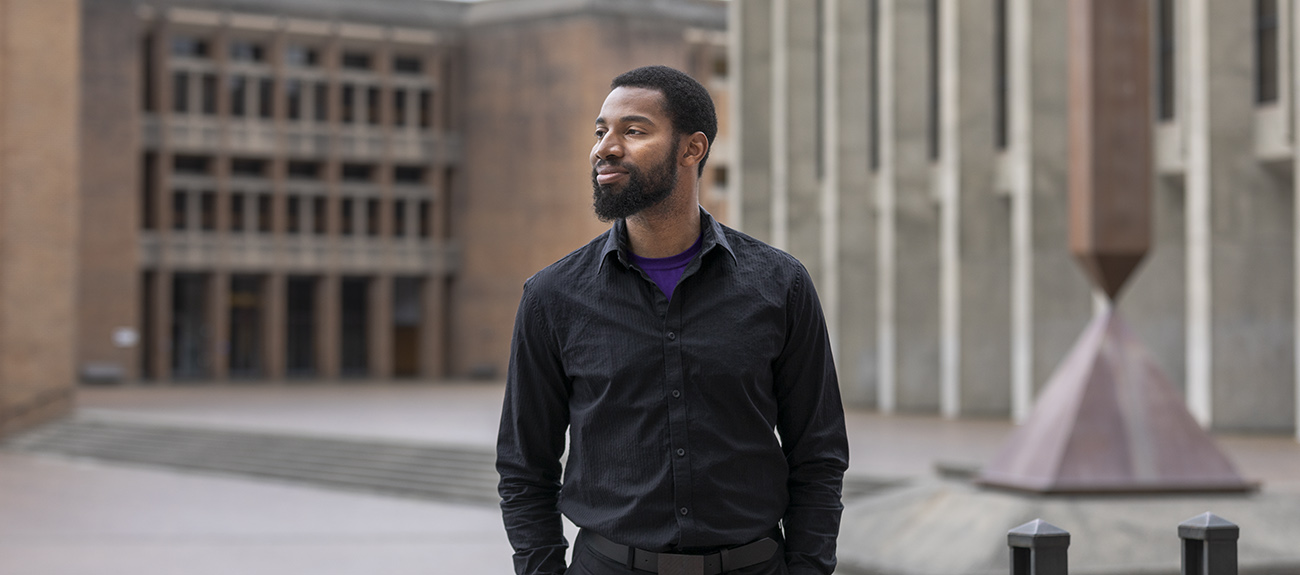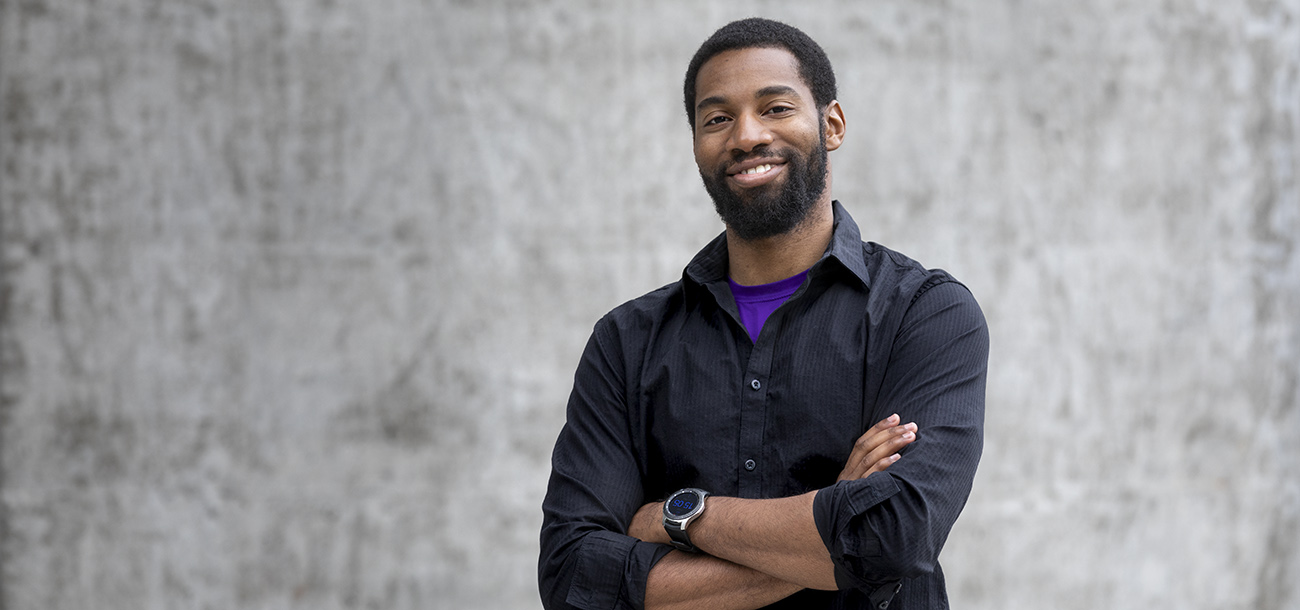
DiShawnn Newell’s interest in psychology started with a grade-school crush. When the girl of his dreams ditched him for another boy in elementary school, he questioned all her friends to understand why. “It was my rudimentary way of exploring the way people think and behave,” he says.
Newell’s fascination with the human mind has never waned. This month he graduates from the UW with a BA in psychology and a BS in neuroscience. But his path to his degrees was anything but direct.

Newell started college more than a decade ago in his home state of Illinois, completing two years at University of Illinois at Urbana-Champaign before deciding to join the military. He became a nuclear electrician in the U.S. Navy, responsible for nuclear reactors and nuclear electricity on submarines. Eight years later he was ready to return to civilian life. “I wanted nothing to do with electricity or nuclear power ever again,” he laughs. What he wanted — still — was to study psychology.
After taking required calculus courses at Olympic College in Bremerton, where he was stationed, Newell transferred to the University of Washington. He was nervous about returning as an older student fresh out of the military.
“I started at the UW about six weeks after I got out of the military,” he recalls. “I had been wearing a uniform every day for the past eight years and had somebody telling me where to be and what to do. My first day at the UW, I spent three hours just trying to figure out what to wear. What are civilian clothes? Then I stepped on campus and suddenly I’m in a sea of people. Hundreds of student clubs were on Red Square vying for attention. It was a sensory overload.”
I was like a kid in a candy store. I needed to explore everything.
Far from being daunted by the commotion, Newell was energized. “I was like a kid in a candy store,” he says. “I needed to explore everything.” That’s where he discovered the UW Men's Rugby Club, which he joined this past year. He also learned about Phi Beta Sigma, a Black fraternity with a focus on academics and leadership. Though Newell was eager to connect with other African American students on campus, he wasn’t sure a fraternity would be a good fit given his age. A conversation with fraternity members convinced him.
“They just won me over,” Newell says. “They were younger than me, but so focused and deliberate in what they do. Their maturity just impressed me.” Another plus: Phi Beta Sigma has no residential house. “I’d slept in nine-man bunks for years,” Newell says. “I was happy to stay on my own, thank you.” After joining Phi Beta Sigma, he later became vice president of the fraternity and treasurer of the National Pan-Hellenic Council, which oversees all Black fraternities and sororities.

Newell also found community through the Department of Psychology, which brings together new transfer students for a 10-week course, PSYCH 299. They learn about campus resources and department opportunities, and become a support system for one another. “That transfer program was everything,” says Newell, who bonded with classmates and with Psychology Department undergraduate adviser Carrie Perrin, who led the class. “It was through Carrie that I really felt comfortable being at the University. Anything you needed, she could make it happen. She was like my mom away from home.”
In fact Newell loved PSYCH 299 so much that he served as a peer adviser the following year. “I knew how impactful the class was for me and wanted to provide that same valuable guidance to other transfer students,” he says.

With transfer credits from University of Illinois and Olympic College, Newell had the potential to graduate in just over one year. But he’d always been fascinated by the biology of the brain, so he stayed on for two more years to complete a second degree in neuroscience. And he made another momentous decision: after long dreaming of becoming a neurosurgeon, he reconsidered the idea of a career in medicine. “I realized that if I pursued neurosurgery as planned, it would be about 14 years before I finished med school, a residency, a fellowship, and an internship. By the time my career really got going, I’d be in my late forties and I knew this timeline wouldn’t be conducive to starting a family.”
Driven to consider other career options, Newell participated in a three-month internship program at Amazon last summer. As an area manager intern, he was assigned a mentor who managed about 130 employees handling outbound orders at a Phoenix warehouse. Two weeks in, the manager put Newell in charge while he worked on another project.

“They were very short of managers and I guess I showed a level of aptitude and gained their trust,” says Newell, who was stunned at the time. “Two weeks in I was running my own department. I learned a lot very quickly. I discovered that 130 people can see one thing from so many different perspectives. It was like nothing I’d experienced before.”
After being thrown into the deep end at Amazon, Newell is still interested in corporate project management. His long-term goal is to become a COO in the tech industry, helping companies strategize and make big-picture decisions. His background in psychology and neuroscience is sure to benefit him in such a role.
“I like talking to people,” he says. “I still love learning about people, being able to anticipate their behaviors. I never get tired of trying to understand why people behave the way they do.”
More Stories

AI in the Classroom? For Faculty, It's Complicated
Three College of Arts & Sciences professors discuss the impact of AI on their teaching and on student learning. The consensus? It’s complicated.

What Students Really Think about AI
Arts & Sciences weigh in on their own use of AI and what they see as the benefits and drawbacks of AI use in undergraduate education more broadly.

A Love of Classics and Ballroom
Michael Seguin studied Classics at the UW and now owns Baltimore's Mobtown Ballroom. The two interests, he says, are more connected than they might seem.